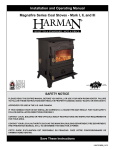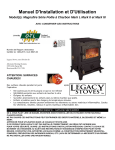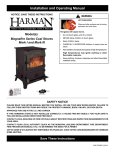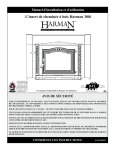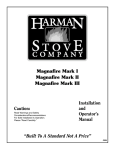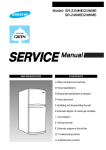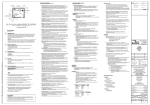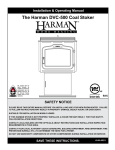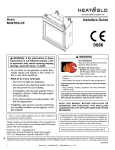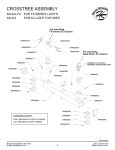Download Harman Stove Company MARK II Stove User Manual
Transcript
Installation and Operating Manual Magnafire Series Coal Stoves - Mark I, II, and III R4 SAFETY NOTICE PLEASE READ THIS ENTIRE MANUAL BEFORE YOU INSTALL OR USE YOUR NEW ROOM HEATER. FAILURE TO FOLLOW THESE INSTRUCTIONS MAY RESULT IN PROPERTY DAMAGE, BODILY INJURY, OR EVEN DEATH. APPROVED FOR USE IN THE U.S. AND CANADA IF THIS HARMAN STOVE IS NOT INSTALLED CORRECTLY, A HOUSE FIRE MAY RESULT. FOR YOUR SAFETY, FOLLOW INSTALLATION DIRECTIONS PRECISELY. CONTACT LOCAL BUILDING OR FIRE OFFICIALS ABOUT RESTRICTIONS AND INSPECTION REQUIREMENTS FOR YOUR AREA. CONTACT YOUR LOCAL AUTHORITY (SUCH AS THE MUNICIPAL BUILDING DEPARTMENT, FIRE DEPARTMENT, FIRE PREVENTION BUREAU, ETC.) TO DETERMINE THE NEED FOR A PERMIT. CETTE GUIDE D’UTILISATION EST DISPONIBLE EN FRANCAIS. CHEZ VOTRE CONCESSIONNAIRE DE HARMAN HOME HEATING. Save These Instructions #3-90-70746 Introduction Thank you for purchasing a Harman Magnafire coal stove. The Magnafire series has been designed and built to last. Whether you’re heating a room or heating your whole house, you’ve made the right choice. Please read this entire instruction manual before attempting to install or operate your new stove. If you have further questions regarding your new stove, contact your Harman dealer. Follow these instructions and you will have many years of warmth and comfort enjoying your new coal stove. If you are a first-time coal burner, keep in mind that you will not have instant success with maintaining a fire. No one does. Following these instructions should help you with the basic principals. Please copy your serial number, from the label on the back of your stove, to the box below. Listed by: OMNI-Test Laboratories, INC Report # 135-S-07-4 THis appliance is also approved for installation into a shop. Safety Notice: Stove is hot while in operation. Keep combustibles such as furniture, fuel, and draperies at least 36 inches away from the appliance. Do not leave small children unattended while in the room with this heater. Always wear gloves when attending to the stove. This stove is not an incinerator. Do not burn garbage, painted or treated wood, or flammable liquids like gasoline kerosene, or engine oil. Magnafire Series Coal Stoves 3 Index 1. 1.1 1.2 1.3 1.4 2. Assembly & installation 3. Venting 4 Safety Considerations - Warnings to operator of possible dangers, fire hazards and cautions. Keep children away -- may cause serious burns Fuel/Firing Warnings Curing Paint Mobile Homes 2.1 Unpacking and Inspection Of Parts 2.2Locating The Stove 2.3Assembly 2.4 General Information 3.1 3.2 3.3 3.4 Types of Chimneys Common Chimney Problems What To Do If You Have A Problem Chimney Details 4. Grates 5. Operating Instructions 5.1 Starting a Fire 5.2Loading Fuel 5.3 Increasing Heat From a Low Fire 5.4 Shaking Ashes 5.5Ashes and Ash Removal 5.6 Safety 6. Preventive Maintenance Instructions 6.1 Periodic and Everyday Maintenance 7. Optional Hot Water Coil 8. Warranty Information 9. Service Parts Diagrams 4.1 Grate System and Controls Magnafire Series Coal Stoves Installation 1. Safety Considerations: 1.1 KEEP CHILDREN AWAY - MAY CAUSE SERIOUS BURNS. CAUTION: All surfaces of the stove are hot while in operation. Do not touch. Keep Children Away. Wear gloves while tending stove. Serious burns will result if special care is not taken. 1.2 Fuel / Firing Information. DANGER! FIRE HAZARD! DO NOT USE CHEMICALS OR FLUIDS TO START OR “FRESHEN UP” A FIRE. SEVERE BODILY INJURY AND/OR A FIRE IN THE HOME MAY RESULT. DO NOT BURN GARBAGE, GASOLINE, THINNERS, KEROSENE, OR FUEL OIL, ETC. AN EXPLOSION, A HOUSE FIRE OR PERSONAL INJURY COULD RESULT. KEEP ALL SUCH LIQUIDS WELL AWAY FROM THE STOVE WHILE IN USE. 2. Assembly & Installation: 2.1 UNPACKING AND INSPECTION OF PARTS. Inspect the stove for any visible damage. The blower and the shaker handle are packaged inside the stove. 2.2 Locating The stove. Locate the stove as close to the chimney or flue as possible while adhering to the recommended clearances to combustible material. Safe stove clearance to combustible walls is 24” to the rear of the stove, and 33” to the sides of the stove. In a corner installation, you need 24” to the side walls. Clearance to the front of the stove, for furniture, etc. is 36” Floor protection, for a combustible floor, must be a minimum of 3/8” thick non-combustible material. The floor protector should extend 8” to either side, and 16” in front of the stove. Floor protection should also be under any horizontal sections of flue pipe. 8” This heater is approved for burning coal only. Use of any other fuel, except for the purpose of coal ignition, is a violation of U.S. law. When and if the chimney pipe or connector reaches 500˚ f. (maximum temperature), the stove is being over-fired. It is recommended that you use magnetic thermometers on the stove and flue connector, to ensure safe operation. 8” 8” This stove consumes air when it is burning. If your house is especially tight, It is advisable that a nearby window be opened slightly while burning the stove. 16” from glass Floor Protector Information in this manual is manufacturer’s recommendations. If there is a discrepancy between these recommendations and your local code requirements, you must follow local codes. 1.3 CURING PAINT. During the first few hours of burning, a blue smoke will be observed rising from the painted surfaces of the stove. This is the paint being cured, and will disappear over time. Increase the amount of fresh air in the room during this initial break-in period. This may be achieved by opening doors or windows. 1.4 Mobile Homes. This stove is not approved for use in mobile /manufactured homes. Magnafire Series Coal Stoves 5 Installation 2.3 Assembly. Slide the blower into the slotted bracket on the rear of the stove. The blower will rest at the bottom of the slot. 2.4 GENERAL INFORMATION. Installation Checklist: A. Have your stove installed by a trained installer. Preferably one who is certified by the National Fireplace Institute or similar certification agency. B. Before starting Installation, check for proper clearance to combustibles where the stove is going to be located. C. Never vent a solid fuel burning appliance into a flue serving another appliance. The shaker handle bolts onto the shaker block using the bolts and lock washers provided. The draft control is bolted through the hole in the center of the ash door as shown below. The knob should spin freely and open to a distance of about 1/4 inch from the door surface, while being able to close against the face of the door. D. Have the chimney inspected and thoroughly cleaned. Inspect that it is a Class “A” chimney either masonry or factory built. If it is a manufactured chimney, ensure that it is installed as per the manufacturers requirements. Be sure that the chimney is tall enough. Solid fuel chimneys fall under a general rule, 16 ft. minimum height, 2 ft. taller than anything within 10 ft., and 3 ft. above where it passes through the roof line. The chimney must be capable of a minimum .06 inches of water column of draft when the stove is burning. The viewing glass is installed between the door and the window frame. The glass gasket is installed only on the sides of the glass panel. The top and bottom of the glass are open to provide air-wash and secondary air to the firebox. The glass frame is secured to the door with four bolts. The Mark II and Mark III also have a top trim piece which bolts onto the top of the door. Be sure the frame bolts and trim bolts are secured. E. Limit the amount of connector pipe. Position the stove as close to the flue as possible. (8 ft. or less) No more than two 90° elbow fittings should be used. Any horizontal connector pipe should have at least 1/4 in. of rise per foot in length. A barometric damper may be installed to prevent excessive or erratic draft. MANUAL DAMPERS OR “HEAT SAVERS” MUST NEVER BE INSTALLED IN THE FLUE PIPE. IMPROPER OPERATION COULD RESULT IN DEATH. 6 Magnafire Series Coal Stoves Venting Where an existing chimney is used, it must be large enough to provide a draft adequate for removing the gaseous products of combustion. The cross-sectional area of the chimney must be at least 25 percent greater than that of the connector. As a general rule, common 8” X 8” flue liner has an actual interior crosssectional area of 42 to 49 inches. This is adequate for a 6 inch stove connector, which matches the appliance flue collar. Important! The connector pipe must be constructed of 24 gauge material or thicker. 3. Venting & Chimneys: 3.1 TYPES OF CHIMNEYS The chimney is one of the most important, yet the most neglected and misunderstood portion of any solid fuel burning appliance installation. Do not connect your stove to a chimney flue that already serves another heating device. The stove must be connected to its own flue. A minimum 8” X 8” is necessary for proper operation. Under no circumstances should a manual flue damper be installed in the smoke pipe between the stove and the chimney. Caution! the chimney must be a “class A” chimney in good working condition. the use of aluminum “type b” gas vent for solid fuels is not only un-safe but it is prohibited by the national fire protection agency (nfpa) code. There are three types of “Class A” chimneys; 1) Masonry with a tile liner, including brick, block, stone, etc. It must be supported by a groundlevel foundation. 2) Insulated “Class A” manufactured chimney, listed and certified by a national test agency. 3) Triple-walled metal “Class A” chimney, listed and certified by a national test agency. 3.2 common chimney problems In order to have a properly operating heating system, the chimney needs to be capable of providing sufficient draft. The minimum required draft is .06 inches of water column (WC). To measure the draft, drill a hole in the connector pipe and attach a draft meter. First, check the draft above the barometric damper (if installed). Then check it below the barometric damper and make your damper adjustment to where it opens to prevent the draft from going higher than the .06 in WC. If the chimney is incapable of supplying the necessary draft, it will need to be improved. Whether it needs to be raised to a taller height, a flue liner installed, or a different style of cap placed on the top, the improvement method will need to be determined. Reasons for insufficient draft; A) Leaking chimney- Air leaking in around a loose fitting cleanout door, joints or seams in connector pipe are not secured properly, cracks or other defects in masonry. B) Improper chimney height - Chimney does not extend to a sufficient height above the roof line. (Remember the 3 ft.-2 ft.-10 ft. rule) C) Obstructions in the chimney - Make sure the chimney has been cleaned. Different animals have been known to build nests in chimneys. D) Trees or other topographical barriers - Trees that are taller than the house can cause the air currents to flow downward over the peak of the roof. This would lead to a down draft effect on the chimney. This can also be caused by adjacent buildings or fixtures. It could even be from a different peak on the same structure. Wind direction If your masonry chimney has not been used for some time, have it inspected by a qualified person (building inspector, fire department personnel, etc.). If a listed and certified manufactured chimney is to be used, make certain it is installed in accordance with the manufacturers instructions and all local codes. A coal stove can perform only as well as its venting system will allow it to. Magnafire Series Coal Stoves 7 Venting & Grates E) Improperly sized flue - Too small of a chimney is incapable of moving the volume of air necessary. Too large of a flue could have trouble warming up to create the necessary upward flow. F) Chimney offsets - Offset chimneys should be avoided if possible. Not only can the offset affect draft, it is also a place for debris to collect over time. G) Too many elbows - The flue connector has more than two elbows in it. Sometimes, depending on overall chimney performance, one elbow could be too many. H) Vent sharing - No more than one heating appliance shall vent into a single flue. THE MOST IMPORTANT THING TO REMEMBER ABOUT CHIMNEYS IS THEIR NEED FOR MAINTENANCE AND CLEANING. IF A CHIMNEY IS NOT CLEANED ON A FREQUENT BASIS, IT WILL AFFECT DRAFT, AS WELL AS BE A CONTRIBUTING FACTOR TO A POTENTIAL CHIMNEY FIRE. 4. Grates 4.1 GRATE SYSTEM AND CONTROLS. The Grates are made of heavy-duty cast iron. The function of the grate system is to support the coal while allowing air flow through the fire. The grate system also allows removal of the ashes by shaking them through the grates. The grates are removable without the use of tools, once the fire bricks are removed, the grates simply lift out. Lift the right end higher to disengage from the shaking link. To re-install the grates, lower them, one at a time, left end first, be sure the grate hooks into the grate link as you drop it into place. Stove body Grates Grate Link 3.3 what to do if you have a problem. If you have a chimney fire: Shaker Handle 1. Be sure everyone is out of the house. 2. Call the fire department. 3. Close the draft control on the ash door and Shaker Bar make sure both doors on the stove are closed and latched. Your grates will last forever, as long as you keep your 4. Do not put water on the fire, this will cause unashes cleaned out of the stove. When ashes are left necessary damage to the stove and flue. pile-up against the grates, the air-flow is blocked. With 5. Have the chimney inspected and repaired prior no air flow through the grates, they will begin to sag to building another fire. from the intense heat. The grates are designed to accommodate three differSmoke puffs out of stove; ent sizes of anthracite coal. Pea is defined as being A) Check previous suggestions for insufficient draft. able to fit through a round screen hole of 9/16” to 7/8”. B) Check draft control for proper operation. Nut or Chestnut is defined as being able to fit through C) Chimney may be too low. Increase height. a round screen hole of 7/8” to 1½”. Finally , Stove coal D) Add more fresh air to the room. Your home may be which is 1½” to 2½” in size. Pea or Nut you’ll find work so tight that there is not enough oxygen getting to the the best for starting a fire, while all three sizes burn fire. just as well. E) Remember, open the draft control and crack the The external shaker handle allows for greater safety door open slightly before reloading or checking the from burns, and the convenience of needing no extra fire. tools. F) Check the ashes. The ash pan and firebox may be overloaded with ashes. G) Check the chimney cleanout door to ensure it closes properly. 8 Magnafire Series Coal Stoves Operation 5. Operating Instructions 5.1 STARTING A FIRE Place seven or eight sheets of crumpled newspaper onto the top of the grates. Next, lay in some small kindling wood (approximately 3/4” or less) on top of the newspaper. Layer the kindling in a criss-cross fashion to allow for maximum air flow. Open the draft control to it’s full open position. Light the paper nearest the center of the door opening and close and latch the load door. After two to three minutes, open the load door an inch or two for a few seconds, then open it completely. This method is good practice to allow smoke to clear away from the load door. Add a few small pieces of firewood when the kindling is burning well. Close the door again and be sure the draft control remains open. The ash door itself may be opened for a short period to accelerate the process. DO NOT LEAVE THE STOVE UNATTENDED WITH THE DOOR OPEN. When a substantial bed of hot wood coals are built up, start adding small amounts of coal on top of the burning wood embers. (Pea or Nut sized coal will give the best results when starting a fire.) Keep the draft control open through the whole ignition process. As the coal begins to free-burn, continue adding small amounts until there is a solid bed of burning coal. Do not add too much at one time as you could smother the fire. Allow sufficient time between these small batches so that the coal can ignite thoroughly before more is added. Once a substantial bed is established, fill the firebox to the top of the bricks. A deep bed of coal will always burn better than a shallow bed. Adjust the draft control to the desired heat output. You’ll learn over time that the coal fire does not instantly change with a turn of the draft control. Make your adjustments in small increments and wait for the fire to stabilize. The normal range of control settings will be from closed, for extended burn times, to one full turn open. NOTE: If the ash door was opened during the lighting process, it must be closed to prevent over-firing. Over-firing can cause dangerously high temperatures. 5.2 LOADING Coal should never be added unless there is a reasonably hot fire. The coal bed should be bright and vigorous. If the fire is burning hot and there is a deep bed of hot coals, full loads of coal can be added at any time. However, if there is not a deep bed of coals, it is best to add in small batches as during lighting. 5.3 INCREASING HEAT FROM A LOW FIRE Every effort should be made to not let a coal fire burn so long that it begins to die. This causes the reloading process to be much longer, and there is a good possibility of losing the fire all together. Do not shake or stir a low fire. Open the draft control or the ash door to get the maximum air flow. Allow the fire to get reasonably hot. If there is not enough un-burned coal to renew the fire, add a small amount. Continue adding coal in small amounts until a full bed is established. Now, shake the grates. (see next section “shaking ashes”) DO NOT LEAVE THE STOVE UNATTENDED WITH THE DOOR OPEN. 5.4 SHAKING ASHES Shaking should be done only when there is a hot fire. The frequency of shaking will depend on the rate of burning. Shaking should be done at least once per day but best results will come from shaking twice a day. When shaking, do just that. Do not rock the handle in long strokes, just shake it briskly until you see red hot ashes fall into the ash pan. Rocking the grates may allow pieces of coal to jam them in an open position. 5.5 ASHES AND THEIR REMOVAL Ashes should never be allowed to accumulate in the ash pan. Excess ash build up can restrict air flow to the fire and can also cause damage to the grates. Ashes should be placed in a metal container with a tight fitting lid, pending final disposal. The closed container of ashes should be placed on a non-combustible floor or on the ground, well away from any combustible materials. If the ashes are disposed of by burial in soil or otherwise locally dispersed, they should be retained in the sealed container until all cinders have thoroughly cooled. CAUTION! ASHES SHOULD NEVER BE ALLOWED TO ACCUMULATE ABOVE THE TOP OF THE ASH PAN. ASHES IN CONTACT WITH THE BOTTOM OF THE GRATES ACT AS AN INSULATOR INTENSIFYING THE HEAT ON THE GRATES, AND WILL CAUSE THE GRATES TO WARP. GRATE DAMAGE FROM ASH BUILD UP IS EASILY RECOGNIZED. PLEASE REFER TO YOUR WARRANTY TO SEE HARMAN STOVES LIMIT OF LIABILITY IN CASES OF ABUSE OR NEGLECT. Coal produces considerably more ash than wood. For equal heat output, coal will produce 7 to 10 times the ash of a wood fire. Magnafire Series Coal Stoves 9 Maintenance 5.6 SAFETY Whenever a loading door is opened, it should always be cracked slightly to allow oxygen to enter and burn any gasses that may be present. Failure to do this may result in a sudden ignition of the gasses, leading to an explosion. A Stove should never be filled with excess coal to where the exhaust is impeded. Burning coal generates carbon monoxide. If the flue gas exit is blocked, the carbon monoxide can be forced out of the stove and into your living space, with fatal consequences. With the exception of start-up or freshening a fire, the ash pan door should never be left open. NEVER LEAVE THE STOVE UNATTENDED WITH A DOOR OPEN. Serious damage to the stove can occur from over-heating. Coal stoves should not be installed in a chimney that has a history of down-draft or flow reversal problems. These conditions can cause improper draft, resulting in carbon monoxide entering the living space rather than being drawn up the chimney. REMEMBER! COAL GASES ARE TOXIC! Sulfur dioxide, sulfur trioxide and other products of coal combustion may corrode stainless steel and masonry chimneys. Coal with high sulfur content will destroy chimneys especially fast if soot is left in the flue for extended periods. It is important to clean your chimney regularly. To clean the chimney, use a stiff brush with an extendable handle. Start the brush from the top of the chimney and run it down through the flue. Continue brushing until the entire length of the chimney is cleaned. The debris will collect at the bottom of the chimney. Open the cleanout door or other access point and sweep the collection into a metal container. The connector pipe can be brushed also, remove it from the stove if possible, to eliminate pushing the debris into the stove’s spiral chamber. Ashes should be kept in a metal container with a tight fitting lid. The closed container of ashes should be placed on a non-combustible floor or on the ground, well away from all combustible materials, pending final disposal. If the ashes are disposed of by burial in soil or otherwise locally dispersed, they should be kept in the closed container until all cinders have thoroughly cooled. Do not use this same container for garbage, debris, or lawn waste. This is the Spiral Chamber which must be cleaned periodically. 6. Maintenance 6.1 PERIODIC AND EVERYDAY MAINTENANCE Blower: Monthly, remove the blower and clean the fan. If there are pets in your house, you may want to check this more frequently. Grates: Keep ash pan emptied. Twice a day. Chimney and connector: Avoid chimney fires. On a regular schedule, check for creosote and soot build up in the venting and the baffle area of the stove. These areas must be kept clean. Steel brushes are the safest for cleaning metal surfaces. Salt solutions and other chemicals may damage the metal surfaces. 10 Magnafire Series Coal Stoves Secondary Air enters through the Air -wash opening in the glass frame. Primary Air enters through the draft control. Optional Water Coil 7. Optional Hot Water Coil: Plumbing Diagrams- Washer Inside Nut Outside Nut Packing Stove Body Magnafire Series Coal Stoves 11 Optional Water Coil To install the optional hot water coil, Two holes will need to be drilled or cut into the side of the stove. There is a template for the hole location(s) that is included with the coil. Keep the holes above the firebricks and toward the back of the firebox. This location is best to not interfere with loading. Thermo- Siphon Method This is the simple and most economical method, however, the hot water tank must be no more than ten feet from the stove. The water inlet, where the pressure relief valve is located, must be higher than the top leg of the coil. The tank should be elevated, if necessary, to allow for proper thermo-siphon action (the method by which water will circulate automatically through the system). Circulating Pump Method This method is used when the water heater tank can not be located close enough to the stove for the ThermoSiphon Method, or if the water tank is on a lower floor level than the stove. In addition to the circulating pump, you may want to add an aquastat to thermostatically control the pump. This is optional and not necessary if the pump is left run continuously. Another option would be a gate valve placed near the pump to control the rate of water flow. Read and follow all of the instructions that are included with the coil. 12 Magnafire Series Coal Stoves 8. Warranty Information: Hearth & Home Technologies Inc. LIMITED LIFETIME WARRANTY Hearth & Home Technologies Inc., on behalf of its hearth brands (”HHT”), extends the following warranty for HHT gas, wood, pellet, coal and electric hearth appliances that are purchased from an HHT authorized dealer. WARRANTY COVERAGE: HHT warrants to the original owner of the HHT appliance at the site of installation, and to any transferee taking ownership of the appliance at the site of installation within two years following the date of original purchase, that the HHT appliance will be free from defects in materials and workmanship at the time of manufacture. After installation, if covered components manufactured by HHT are found to be defective in materials or workmanship during the applicable warranty period, HHT will, at its option, repair or replace the covered components. HHT, at its own discretion, may fully discharge all of its obligations under such warranties by replacing the product itself or refunding the verified purchase price of the product itself. The maximum amount recoverable under this warranty is limited to the purchase price of the product. This warranty is subject to conditions, exclusions and limitations as described below. WARRANTY PERIOD: Warranty coverage begins on the date of original purchase. In the case of new home construction, warranty coverage begins on the date of first occupancy of the dwelling or six months after the sale of the product by an independent, authorized HHT dealer/ distributor, whichever occurs earlier. The warranty shall commence no later than 24 months following the date of product shipment from HHT, regardless of the installation or occupancy date. The warranty period for parts and labor for covered components is produced in the following table. The term “Limited Lifetime” in the table below is defined as: 20 years from the beginning date of warranty coverage for gas appliances, and 10 years from the beginning date of warranty coverage for wood, pellet, and coal appliances. These time periods reflect the minimum expected useful lives of the designated components under normal operating conditions. Warranty Period Parts Labor 1 Year 2 years HHT Manufactured Appliances and Venting Gas X X Wood X X X 3 years Pellet EPA Wood Coal X X X X X X X X X Components Covered Electric Venting X X All parts and material except as covered by Conditions, Exclusions, and Limitations listed Igniters, electronic components, and glass Factory-installed blowers Molded refractory panels X Firepots and burnpots 5 years 1 year 7 years 3 years 10 years 1 year X Limited 3 years Lifetime X X X X X 90 Days X X X X X X X X Castings and baffles X X Manifold tubes, HHT chimney and termination Burners, logs and refractory Firebox and heat exchanger X X All replacement parts beyond warranty period See conditions, exclusions, and limitations on next page. 4021-645C 12-29-10 Page 1 of 2 WARRANTY CONDITIONS: • • • • This warranty only covers HHT appliances that are purchased through an HHT authorized dealer or distributor. A list of HHT authorized dealers is available on the HHT branded websites. This warranty is only valid while the HHT appliance remains at the site of original installation. Contact your installing dealer for warranty service. If the installing dealer is unable to provide necessary parts, contact the nearest HHT authorized dealer or supplier. Additional service fees may apply if you are seeking warranty service from a dealer other than the dealer from whom you originally purchased the product. Check with your dealer in advance for any costs to you when arranging a warranty call. Travel and shipping charges for parts are not covered by this warranty. WARRANTY EXCLUSIONS: This warranty does not cover the following: • Changes in surface finishes as a result of normal use. As a heating appliance, some changes in color of interior and exterior surface finishes may occur. This is not a flaw and is not covered under warranty. • Damage to printed, plated, or enameled surfaces caused by fingerprints, accidents, misuse, scratches, melted items, or other external sources and residues left on the plated surfaces from the use of abrasive cleaners or polishes. • Repair or replacement of parts that are subject to normal wear and tear during the warranty period. These parts include: paint, wood, pellet and coal gaskets, firebricks, grates, flame guides, light bulbs, batteries and the discoloration of glass. • Minor expansion, contraction, or movement of certain parts causing noise. These conditions are normal and complaints related to this noise are not covered by this warranty. • Damages resulting from: (1) failure to install, operate, or maintain the appliance in accordance with the installation instructions, operating instructions, and listing agent identification label furnished with the appliance; (2) failure to install the appliance in accordance with local building codes; (3) shipping or improper handling; (4) improper operation, abuse, misuse, continued operation with damaged, corroded or failed components, accident, or improperly/ incorrectly performed repairs; (5) environmental conditions, inadequate ventilation, negative pressure, or drafting caused by tightly sealed constructions, insufficient make-up air supply, or handling devices such as exhaust fans or forced air furnaces or other such causes; (6) use of fuels other than those specified in the operating instructions; (7) installation or use of components not supplied with the appliance or any other components not expressly authorized and approved by HHT; (8) modification of the appliance not expressly authorized and approved by HHT in writing; and/or (9) interruptions or fluctuations of electrical power supply to the appliance. • Non-HHT venting components, hearth components or other accessories used in conjunction with the appliance. • Any part of a pre-existing fireplace system in which an insert or a decorative gas appliance is installed. • HHT’s obligation under this warranty does not extend to the appliance’s capability to heat the desired space. Information is provided to assist the consumer and the dealer in selecting the proper appliance for the application. Consideration must be given to appliance location and configuration, environmental conditions, insulation and air tightness of the structure. This warranty is void if: • • • The appliance has been over-fired or operated in atmospheres contaminated by chlorine, fluorine, or other damaging chemicals. Over-firing can be identified by, but not limited to, warped plates or tubes, rust colored cast iron, bubbling, cracking and discoloration of steel or enamel finishes. The appliance is subjected to prolonged periods of dampness or condensation. There is any damage to the appliance or other components due to water or weather damage which is the result of, but not limited to, improper chimney or venting installation. LIMITATIONS OF LIABILITY: • The owner’s exclusive remedy and HHT’s sole obligation under this warranty, under any other warranty, express or implied, or in contract, tort or otherwise, shall be limited to replacement, repair, or refund, as specified above. In no event will HHT be liable for any incidental or consequential damages caused by defects in the appliance. Some states do not allow exclusions or limitation of incidental or consequential damages, so these limitations may not apply to you. This warranty gives you specific rights; you may also have other rights, which vary from state to state. EXCEPT TO THE EXTENT PROVIDED BY LAW, HHT MAKES NO EXPRESS WARRANTIES OTHER THAN THE WARRANTY SPECIFIED HEREIN. THE DURATION OF ANY IMPLIED WARRANTY IS LIMITED TO DURATION OF THE EXPRESSED WARRANTY SPECIFIED ABOVE. 4021-645C 12-29-10 Page 2 of 2 9. Service Parts Mark I Service Parts Magnafire Freestanding Coal Stove Beginning Manufacturing Date: N/A Ending Manufacturing Date: Active 1-70-03224-1 (Black), 1-70-03224-2 (Charcoal), 1-70-03224-3 (Goldenfire), 1-70-03224-4 (Metallic Blue), 1-70-03224-10 (Mojave Red), 1-70-03224-12 (Forest Green) 1 2 3 4 5 IMPORTANT: THIS IS DATED INFORMATION. When requesting service or replacement parts for your appliance please provide model number and serial number. All parts listed in this manual may be ordered from an authorized dealer. ITEM 1 DESCRIPTION Load Door - Roped Door Kit Assembly Door Kit Assembly (Gold) 2 COMMENTS Glass Frame Glass Frame (Gold) Draft Control (Gold) PART NUMBER 1-10-08145A Black classic No longer available Cast No longer available Rect Glass 7-1/4” X 10-1/2” Draft Control Stocked at Depot 1-00-00139-1 1-00-00139-4 4-00-00038-1 3-00-00038-4 3-40-7251050 Cast No longer available Pkg of 3 Y 4-00-00109-1 3-00-00109-4 3 Spring Handle 1/2” 4 Short Shaker Handle Weldment 3-40-00086-3-3 1-10-01001 5 Ash Door - Roped 1-10-08143A Y Additional service parts on following page 02/11 Mark I Service Parts Beginning Manufacturing Date: N/A Ending Manufacturing Date: Active IMPorTaNT: THIS IS daTed INForMaTIoN. When requesting service or replacement parts for your appliance please provide model number and serial number. all parts listed in this manual may be ordered from an authorized dealer. ITEM DESCRIPTION COMMENTS Stocked at Depot PART NUMBER ash Pan 1-10-65127 baffle 2-00-00503b blower - 75cfm, 7ft Cord 3-21-07584 Y 1-00-900450125 Y brick 9” X 4-1/2” x 1-1/4” Pkg of 7 Y brick bracket 2-00-01006 brick Set 1-00-00836 Y door Handle - Cast 4-00-00042 Y door latch 4 Sets 1-00-00036 Y door Pin 3/8 x 1-7/8 (ash Pan & load door) Pkg of 4 4-30-00138b Y Gasket 1/2” round rope (load door - ash door ) 1-00-53500 Y Gasket, 5/8” Channel(Glass) 1-00-98187 Y Grate Holder 2 - Cast 3-00-00193 Y Grate link 2 - Cast 3-00-00203 Y Mag Grate 15” - Cast (2 per) 3-00-00208 Y Mag leg - Cast 4-00-00044P Shaker bar Weldment 1-1/2” 1-10-02015W Y Shaker block 2-00-01037-1 Y Shaker Handle Mount 2-00-01037-2 Y 02/11 Mark II Service Parts Magnafire Freestanding Coal Stove Beginning Manufacturing Date: N/A Ending Manufacturing Date: Active 1-70-03225-1 (Black), 1-70-03225-2 (Charcoal), 1-70-03225-3 (Goldenfire), 1-70-03225-4 (Metallic Blue), 1-70-03225-10 (Mojave Red), 1-70-03225-12 (Forest Green) 1 2 3 4 5 IMPorTaNT: THIS IS daTed INForMaTIoN. When requesting service or replacement parts for your appliance please provide model number and serial number. all parts listed in this manual may be ordered from an authorized dealer. ITEM 1 DESCRIPTION load door - roped door Kit assembly door Kit assembly (Gold) 2 COMMENTS Glass Frame Glass Frame (Gold) PART NUMBER 1-10-08140a Classic black No longer available Cast No longer available Stocked at Depot Y 1-00-00141-1 1-00-00141-4 4-00-00037-1 3-00-00037-4 rect Glass 8-1/2” X 14-15/16” 3-40-8501494 Y rect Glass 4-1/2” X 8-1/2” (Triple Frame) 3-40-450850 Y draft Control draft Control (Gold) 3 Spring Handle 1/2” 4 Short Shaker Handle Weldment 5 ash door Cast No longer available Pkg of 3 Cast 4-00-00109-1 3-00-00109-4 3-40-00086-3-3 1-10-01001 Y 4-00-00213d Y additional service parts on following page. 02/11 Mark II Service Parts Beginning Manufacturing Date: N/A Ending Manufacturing Date: Active IMPorTaNT: THIS IS daTed INForMaTIoN. When requesting service or replacement parts for your appliance please provide model number and serial number. all parts listed in this manual may be ordered from an authorized dealer. ITEM DESCRIPTION COMMENTS PART NUMBER Stocked at Depot ash Pan 1-10-00722 baffle 2-00-00360b blower - 75cfm, 7ft Cord 3-21-07584 Y 1-00-900450125 Y brick 9” X 4-1/2” x 1-1/4” Pkg of 7 Y brick bracket 2-00-01006 brick, Set of cut 1-00-00837 Y door Handle Cast 4-00-00042 Y door latch 4 Sets 1-00-00036 Y door Pin 3/8 x 2-1/4 (load door) Pkg of 4 4-30-00138a Y 1-00-53500 Y Gasket 1/2” round rope (load door - ash door) Gasket, 5/8” Channel (glass) 1-00-98187 Y Grate Holder - Cast Qty 2 req 3-00-00193 Y Grate link 2 - Cast Qty 2 req 3-00-00203 Y Hot Water Coil load door Top load door Top (Gold) Mag Grate 20” - Cast 3-10-49201 Cast No longer available Qty 2 req 4-00-00034-1 3-00-00034-4 3-00-00211 Y Mag leg - Cast 4-00-00044P Shaker bar Weldment 1-1/2” 1-10-02015W Y Shaker block 2-00-01037-1 Y Shaker Handle Mount 2-00-01037-2 Y Short door Pin 3/8 x 1-7/8 (ash Pan) Pkg of 4 4-30-00138b Y 5/16” Zinc Plated Split lock Washer Pkg of 100 3-30-0101-100 Y 5/16-18 x 3/4” Grade 5 Zinc Plated Hex Cap Screw Pkg of 100 3-30-1125-100 Y 02/11 Mark III Service Parts Magnafire Freestanding Coal Stove Beginning Manufacturing Date: N/A Ending Manufacturing Date: Active 1-70-03227-1 (Black), 1-70-03227-2 (Charcoal), 1-70-03227-3 (Goldenfire), 1-70-03227-4 (Metallic Blue), 1-70-03227-10 (Mojave Red), 1-70-03227-12 (Forest Green) 1 2 3 4 5 IMPorTaNT: THIS IS daTed INForMaTIoN. When requesting service or replacement parts for your appliance please provide model number and serial number. all parts listed in this manual may be ordered from an authorized dealer. ITEM 1 DESCRIPTION load door - roped door Kit assembly door Kit assembly (Gold) 2 COMMENTS Glass Frame Glass Frame (Gold) Stocked at Depot PART NUMBER 1-10-08140a Classic black No longer available Cast No longer available Y 1-00-00141-1 1-00-00141-4 4-00-00037-1 3-00-00037-4 rect Glass 4-1/2” X 8-1/2” (Triple Frame) 3-40-450850 Y rect Glass 8-1/2” X 14-15/16” 3-40-8501494 Y draft Control draft Control (Gold) 3 Spring Handle 1/2” 4 Short Shaker Handle Weldment 5 ash door Cast No longer available Pkg of 3 Cast 4-00-00109-1 3-00-00109-4 3-40-00086-3-3 1-10-01001 Y 4-00-00213d Y additional service parts on following page 02/11 Mark III Service Parts Beginning Manufacturing Date: N/A Ending Manufacturing Date: Active IMPorTaNT: THIS IS daTed INForMaTIoN. When requesting service or replacement parts for your appliance please provide model number and serial number. all parts listed in this manual may be ordered from an authorized dealer. ITEM DESCRIPTION COMMENTS Stocked at Depot PART NUMBER ash Pan 1-10-00723 baffle 2-00-00378b blower - 135cfm, 7ft Cord 3-21-13584 Y 1-00-900450125 Y brick 9” X 4-1/2” x 1-1/4” Pkg of 7 Y brick bracket 2-00-01006 brick, Set of cut 1-00-00838 Y door Handle Cast 4-00-00042 Y door latch 4 Sets 1-00-00036 Y door Pin 3/8 x 1-7/8 (ash Pan) Pkg of 4 4-30-00138b Y door Pin 3/8 x 2-1/4 (load door) Pkg of 4 4-30-00138a Y Gasket 5/8” Channel (Glass) 1-00-98187 Y Gasket 1/2” round rope (load door - ash door) 1-00-53500 Y 1/4-20 x 1/2” Grade 8.2 Zinc Sae Flange bolt Pkg of 50 3-30-2001-50 Y Grate Holder - Cast Qty 3 req 3-00-00194 Y Grate link - Cast Qty 4 req 3-00-00204 Y Hot Water Coil load door Top load door Top (Gold) Mag Grate 20” - Cast 3-10-49201 Cast No longer available Qty 3 req 4-00-00034-1 3-00-00034-4 3-00-00211 Y Mag leg - Cast 4-00-00044P Shaker bar Weldment 1-1/2” 1-10-02015W Y Shaker block 2-00-01037-1 Y Shaker Handle Mount 2-00-01037-2 Y Side brick angle 2-00-01100-1d 02/11 Service & Maintenance Log Date Of Service Performed By Description Of Service Service & Maintenance Log Date Of Service Performed By Description Of Service Proudly Printed On 100% Recycled Paper
























